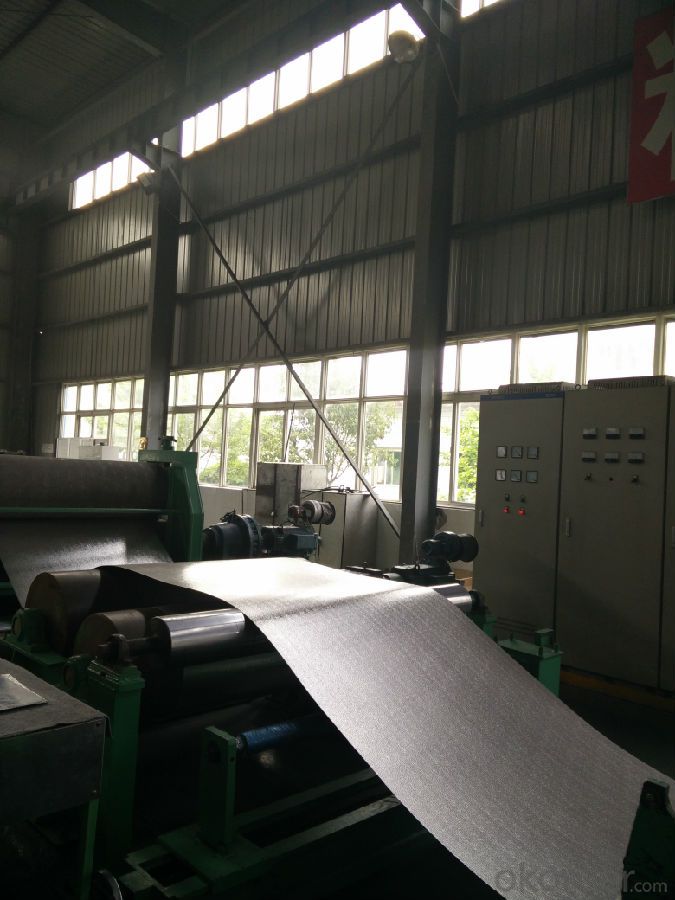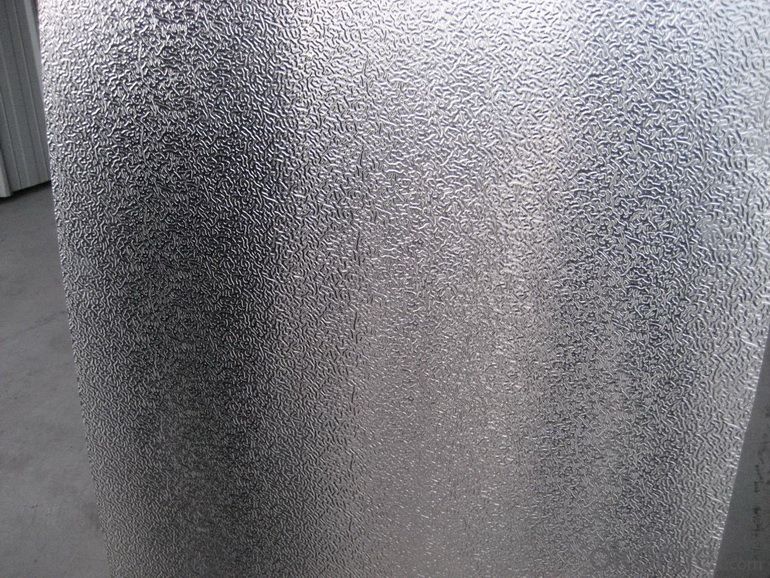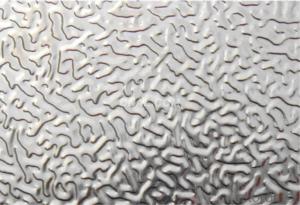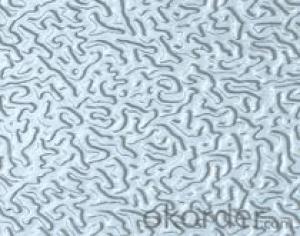Embossed Aluminum Stucco for Air-Conditionary
- Loading Port:
- Shanghai
- Payment Terms:
- TT OR LC
- Min Order Qty:
- 4 m.t.
- Supply Capability:
- 100000 m.t./month
OKorder Service Pledge
OKorder Financial Service
You Might Also Like
1.Structure of Embossed Aluminum Stucco for Air-Conditionary :
Embossed Aluminum Stucco for Air-Conditionary is widely used in the manufacturing of air-conditionary.Embossed Aluminum Stucco for Air-Conditionary is popular in Africa, Middle East and America markets
2.Main Features of the Embossed Aluminum Stucco for Air-Conditionary:
• Beautiful parten
• High manufacturing accuracy
• High strength of extension and yield
• Well packaged
• No marks, no scratch, no excessive oil
3. Embossed Aluminum Stucco for Air-Conditionary
Alloy: 1050, 1060, 1070, 1100, 3003, 3004, 3005, 3105, 5052, 5083, 5754, 8011, 8006
Temper: H14, H16, H18, H22, H24, H26, H32, O/F
Thickness: 0.2mm-20mm
Width: 10mm-1500mm
4. Production of Embossed Aluminum Stucco for Air-Conditionary


5.FAQ
We have organized several common questions for our clients,may help you sincerely:
① How about your company?
A world class manufacturer & supplier of aluminum coil and alloy blanks. Aluminum production base is comprised of 18 aluminum annealers, 10 coil and foil mills, 4 continuous production lines, 2 hot rolling production line and 3 prepainted lines.
Export 5000 tons per month to Asia, America and Middle East. Always do the best for our clients.
②Can you guarantee the quality of the products?
We are responsible for the quality of materials to get a long-term cooperation with clients in a reasonable period of time and we are glad to arrange and coordinate any third party inspection for you.
③What is the delivery time after purchase?
35 day after receiving client’s deposit or correct LC
- Q:How do aluminum coils contribute to lightweight transportation?
- The inherent properties and versatile applications of aluminum coils make them a significant contributor to lightweight transportation. Firstly, aluminum itself is a lightweight material, with a density one-third that of steel, making it perfect for constructing different transportation vehicle components like cars, airplanes, and trains. In terms of manufacturing aluminum coils, they are typically produced through a continuous casting and rolling process, resulting in a coil shape that is easy to transport and handle. Depending on the specific requirements of the transportation industry, these coils can be further processed into sheets, plates, or other forms. The lightweight nature of aluminum coils offers numerous advantages for transportation. Firstly, it reduces the overall weight of the vehicle, leading to improved fuel efficiency and reduced emissions. Lighter vehicles require less energy to move, resulting in cost savings and environmental benefits. Additionally, the reduced weight allows for increased payload capacity, enabling transportation companies to carry more goods or passengers without exceeding weight limitations. Furthermore, aluminum coils possess excellent corrosion resistance, ensuring the longevity of transportation vehicles even in harsh environments. This durability reduces maintenance and replacement costs, making aluminum a economically viable choice for lightweight transportation. Moreover, aluminum coils offer excellent formability and can be easily shaped into different designs. This flexibility in design allows manufacturers to create aerodynamic structures that further enhance fuel efficiency. Vehicles can be produced with reduced drag and improved performance, contributing to lightweight transportation. In conclusion, aluminum coils are crucial in lightweight transportation as they provide a lightweight, durable, and corrosion-resistant material. Their utilization in various transportation components helps reduce overall vehicle weight, improve fuel efficiency, increase payload capacity, and enhance aerodynamics. As the transportation industry continues to prioritize sustainability and efficiency, aluminum coils will continue to play a significant role in achieving these goals.
- Q:Are there any limitations to the widths of aluminum coils?
- Yes, there are limitations to the widths of aluminum coils. The maximum width is determined by various factors such as the capabilities of the manufacturing equipment, transportation limitations, and the desired application of the aluminum coils. Additionally, the thickness and weight of the coil can also influence the maximum width that can be achieved.
- Q:How do aluminum coils compare to magnesium coils in terms of strength?
- In comparison to magnesium coils, aluminum coils typically exhibit greater strength. Aluminum is renowned for its exceptional strength-to-weight ratio, thus rendering it a favored option across multiple industries. It boasts a higher tensile strength and superior resistance to deformation when subjected to stress, unlike magnesium. Moreover, aluminum possesses a higher yield strength, enabling it to withstand more substantial loads before succumbing to permanent deformation. Conversely, magnesium, despite its lighter nature, tends to possess inferior strength attributes. Although magnesium coils may prove beneficial in specific scenarios where weight plays a crucial role, aluminum coils are generally favored for their strength and longevity.
- Q:why is aluminum used for railway lines?thanks x
- contrary to the other answers, for that amount of heat you need something thicker than 1/16 inch, that won't allow enough heat to flow from the hot spot (the IC) to the rest of the aluminum. I suspect when the heat sink gets hot, it's only near the IC, and cooler elsewhere. You need 1/4 inch thick, perhaps 1/2 But you also need a lot of surface area, and possibly fans. .
- Q:Can aluminum coils be used for roofing?
- Certainly, roofing can be done using aluminum coils. Aluminum is widely regarded as a top preference for roofing materials because of its sturdy composition, lightweight properties, and exceptional resistance to corrosion. In a wide range of roofing applications, including residential, commercial, and industrial structures, aluminum roofing coils are frequently employed. They offer exceptional safeguarding against severe weather conditions like intense rainfall, snowfall, and powerful winds. Furthermore, aluminum coils possess energy-efficient attributes as they possess the ability to reflect solar heat, thereby aiding in preserving a cool indoor environment and reducing energy expenditures. All in all, aluminum coils present a dependable and enduring roofing solution.
- Q:Can aluminum coils be used for sound insulation?
- Yes, aluminum coils can be used for sound insulation. Aluminum has excellent properties for soundproofing due to its high density and ability to absorb and dissipate sound waves. When used as a coil, aluminum can effectively block and reflect sound, reducing noise transmission and providing insulation. Additionally, aluminum coils can be easily installed and are resistant to corrosion, making them a durable and long-lasting option for soundproofing applications.
- Q:How do aluminum coils compare to nickel coils in terms of conductivity?
- Aluminum coils generally have lower electrical conductivity compared to nickel coils. This is primarily because aluminum has a higher resistivity than nickel. In terms of conductivity, nickel is a superior conductor of electricity due to its lower resistivity. Therefore, nickel coils are often preferred in applications where high conductivity is crucial, such as in electrical circuits or heating elements. However, it is important to note that aluminum coils still possess reasonable conductivity and may be suitable for certain applications where cost-effectiveness or lightweight properties are more important factors to consider.
- Q:Can aluminum coils be used in electrical transmission systems?
- Aluminum coils have the ability to be utilized in electrical transmission systems. The utilization of aluminum is prevalent in electrical transmission systems due to its advantageous electrical conductivity, high strength-to-weight ratio, and cost-effectiveness in comparison to other materials like copper. Transformers, motors, generators, and other electrical devices benefit from the application of aluminum coils. Additionally, aluminum coils possess the advantage of being lightweight, simplifying their handling and installation in transmission systems. It is important, however, to take into account that aluminum has lower electrical conductivity than copper, necessitating larger cross-sectional areas to achieve the same electrical performance. To maintain efficiency, reliability, and safety, it is crucial to adhere to proper design and engineering practices when sizing and connecting aluminum coils in electrical transmission systems.
- Q:who invented aluminum and or aluminum foil?
- Scientists suspected that an unknown metal existed in alum as early as 1787, but they did not have a way to extract it until 1825. Hans Christian Oersted, a Danish chemist, was the first to produce tiny amounts of aluminum. During that time, the method to extract aluminum was so costly that aluminum once was considered more precious than gold. The plant, owned by J.G. Neher Sons (aluminum manufacturers) started in 1886 in Schaffhausen, Switzerland, at the foot of the Rhine Falls - capturing the falls’ energy to produce aluminum. Neher's sons together with Dr. Lauber discovered the endless rolling process and the use of aluminum foil as a protective barrier. From there began the wide use of aluminum foil in the packaging of chocolate bars and tobacco products. Processes evolved over time to include the use of print, color, lacquer, laminate and the embossing of the aluminum. Although the technology to extract aluminum improved greatly, it still is a energy extensive process. If you, as a chemist can figure out a way to reduce the amount of energy needed to extract aluminum even by 1%, your method can make you a millionaire overnight. There is a thought to motivate you to study Chem. =)
- Q:What are the different thicknesses available for aluminum coils?
- Aluminum coils are available in various thicknesses to cater to different application requirements. The thickness options typically range from 0.2mm to 6mm. The specific thickness needed depends on the intended use of the aluminum coil. Thinner coils, such as those with a thickness of 0.2mm to 1mm, are often used in electronics, packaging, and building materials where flexibility and lightweight properties are important. Medium thickness coils, ranging from 1mm to 3mm, are commonly employed in automotive parts, roofing, and cladding applications. On the other hand, thicker aluminum coils, with a thickness of 3mm to 6mm, are utilized in heavy-duty industrial applications like shipbuilding, aerospace, and construction. It is important to consider the specific requirements and intended use of the aluminum coil to determine the most suitable thickness for the desired application.
1. Manufacturer Overview |
|
|---|---|
| Location | |
| Year Established | |
| Annual Output Value | |
| Main Markets | |
| Company Certifications | |
2. Manufacturer Certificates |
|
|---|---|
| a) Certification Name | |
| Range | |
| Reference | |
| Validity Period | |
3. Manufacturer Capability |
|
|---|---|
| a)Trade Capacity | |
| Nearest Port | |
| Export Percentage | |
| No.of Employees in Trade Department | |
| Language Spoken: | |
| b)Factory Information | |
| Factory Size: | |
| No. of Production Lines | |
| Contract Manufacturing | |
| Product Price Range | |
Send your message to us
Embossed Aluminum Stucco for Air-Conditionary
- Loading Port:
- Shanghai
- Payment Terms:
- TT OR LC
- Min Order Qty:
- 4 m.t.
- Supply Capability:
- 100000 m.t./month
OKorder Service Pledge
OKorder Financial Service
Similar products
New products
Hot products
Hot Searches
Related keywords





























